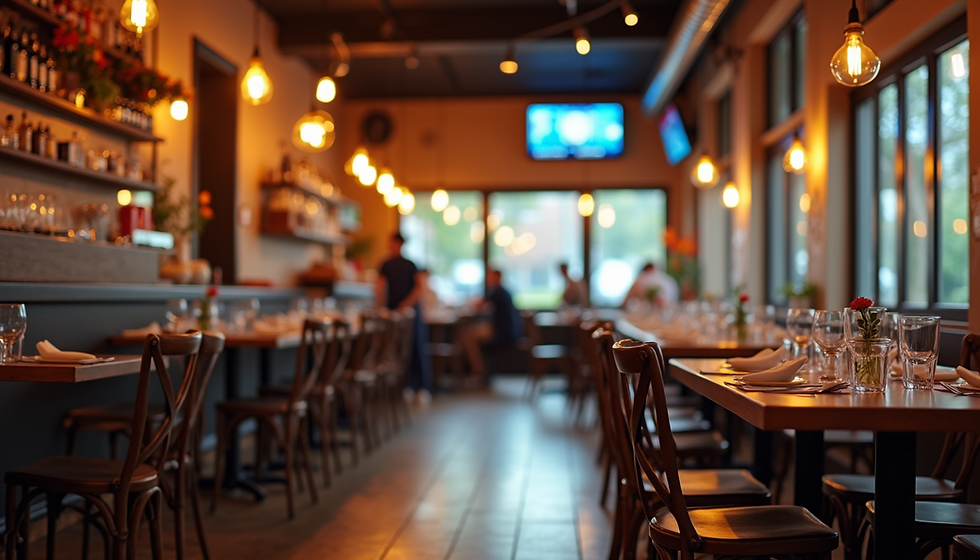The Importance of Yelp for Restaurants: Maximizing Reviews and Boosting Visibility
- The Kitxens Team

- Sep 29, 2024
- 3 min read

Yelp has become a powerful tool for restaurant businesses. With over 32 million unique app users and 72 million unique web visitors monthly, the platform offers a significant opportunity for increasing visibility and attracting new customers. For restaurant owners, Yelp is no longer an option but a necessity.
Why Yelp Matters for Restaurants
According to a Harvard study, a one-star rating increase on Yelp can boost restaurant revenues by 5-9%. With 97% of consumers reading online reviews before making a purchase and 82% visiting Yelp to make buying decisions, having a well-maintained Yelp profile is critical. Restaurants are the second-most reviewed business category, making Yelp the go-to platform for diners looking for a great experience.
Navigating Yelp Reviews: The Good, the Bad, and the Filtered
While Yelp reviews can be a valuable asset, they also require careful management. Restaurants can encounter issues with negative reviews, and Yelp’s filtering system can make it challenging to display legitimate positive feedback. Yelp’s algorithm may filter reviews based on user activity, including new users with little to no previous reviews, overly positive reviews, or reviews that are too short.
Restaurant owners need to focus on engaging Yelp "power users"—those who are active on the platform and contribute regularly—since their reviews are more likely to remain visible.
The Yelp Review Filter: How It Affects Restaurants
Yelp’s filtering system can frustrate businesses, but it’s important to understand why it exists. The platform's goal is to maintain credibility, which is why reviews are filtered based on various factors, such as whether the reviewer is a new user or has limited activity on the site. Reviews deemed “too positive” or “over-the-top negative” are often excluded, as are brief or guideline-violating comments.
Strategies for Handling Negative Yelp Reviews
Negative reviews are inevitable, but they don’t have to hurt your restaurant’s reputation. Responding to these reviews quickly and professionally is key. A well-crafted response shows potential customers that you value feedback and are committed to improving their experience. Ignoring reviews or responding poorly can damage your reputation, especially since many users read both negative reviews and business responses before making a decision.
Why You Should Never Ask for Yelp Reviews
While it’s common practice for businesses to ask customers for referrals and testimonials, Yelp strictly prohibits soliciting reviews. Asking for reviews can result in penalties, such as reviews being filtered out or, in some cases, a business profile being flagged. Instead, encourage organic feedback by providing an exceptional customer experience and allowing reviews to happen naturally.
Driving Sales with Yelp: How to Leverage the Platform
Restaurants on Yelp benefit from an active and engaged presence. A fully completed Yelp profile, high-quality images, and consistent business information can help attract more customers. 92% of Yelp users make a purchase after visiting the platform, with 42% purchasing within a day. Having updated photos of your restaurant’s interior, food, and ambiance creates a positive first impression for potential diners.
Optimizing Your Yelp Profile for Restaurants
Claim Your Business: If your restaurant is already listed on Yelp, claim your business profile to gain control over the content. Once claimed, you can update information and add photos.
Ensure Accurate Location Information: Many diners use Yelp for location-based searches, so having correct and consistent location information across Yelp, Google, and other platforms is critical.
Upload High-Quality Photos: Photos are essential on Yelp. Showcase your dishes, atmosphere, and overall restaurant experience with professional-level images.
Engage with Customers: Responding to both positive and negative reviews is important. A simple thank you to a positive review shows appreciation, while a thoughtful response to a negative review can mitigate damage.
How Yelp’s Tools Can Help Restaurants Grow
Restaurants can use Yelp’s suite of tools to maximize their exposure. Yelp Ads, Yelp Reservations, and Yelp Waitlist are just a few examples of features that can help drive traffic. These tools enable you to capture the attention of potential customers actively searching for dining options.
Yelp has proven itself to be an indispensable platform for restaurants. With millions of users relying on Yelp to guide their dining decisions, having a well-maintained profile can make the difference between success and stagnation. Restaurant owners who invest time and effort into managing their Yelp presence—engaging with reviews, optimizing their profile, and leveraging Yelp’s tools—will be better positioned to thrive in today’s competitive marketplace.




Comments